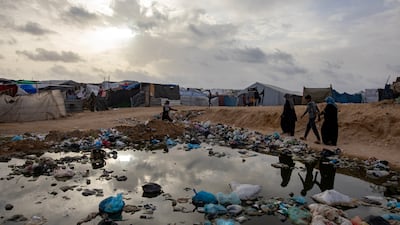Live updates: Follow the latest on Israel-Gaza
The collapse of basic services during more than six months of war in the Gaza Strip has led to an accumulation of uncleared waste that is causing severe health and environmental issues, officials have told The National.
Gazans struggling with displacement, destruction of medical facilities and scarcity of food are now having to deal with the stench from rotting rubbish, which has become a breeding ground for disease-spreading pests.
“There is an accumulation of over 90,000 tonnes of waste, and with rising temperatures, it has become a real environmental catastrophe due to decomposition and the significant increase in the spread of foul odours in recent days,” said Hussni Mohanna, spokesman for the municipality in Gaza city.
There has also been a significant increase in insects and rodents in the surrounding areas, making the piles of waste a focal point for the spread of infectious diseases among displaced civilians and residents, Mr Mohanna said.
There has been a jump in the number of people contracting infectious skin diseases, gastrointestinal diseases and hepatitis, he said.
Gaza was already struggling to dispose of about 2,000 tonnes of waste generated each day before the war, but now a lack of rubbish collection vehicles and the fuel to operate them has made the problem worse, according to humanitarian agencies.
Gaza city's landfill is located in a dangerous area amid continuing Israeli air strikes and shelling, which makes taking rubbish there highly risky, according to Mr Mohanna.
“The municipality, along with local committees and youth volunteer teams, are attempting to conduct campaigns to collect waste and burn it in temporary landfill sites within the city,” he told The National.
However, toxic gases from the burning waste adds to the air pollution the city is experiencing because of the Israeli bombardment, he said.
"We have observed issues such as difficulty breathing, chest pain and chest tightness related to waste burning," said Ahmad Salah, a health worker at a medical centre in a Beit Lahia, north of Gaza city.
“This exacerbates the pain and complicates treatment for these cases, as overcrowding in homes and shelter centres, along with the lack of electricity to operate fans that would alleviate the situation, are contributing factors," he said.
At the same time, there has been an increase in cases of people with skin issues such as itching, or pruritus, due to the increase in insects because of the accumulation of waste in front of shelters and civilians' homes, Mr Salah said.
“Some people have sensitivities in their bodies, and they are affected by the bites of small insects like flies and mosquitoes. A treatment with at least antipruritic medication and sometimes antibiotics to reduce the effects of redness and swelling is needed."

However, public hospitals in northern Gaza are unable provide these medications and they are not even available at commercial pharmacies for those able or willing to pay for them.
Ramzi Fadous, 35, told The National that the rubbish was making it impossible for his family to continue living in their tent in the courtyard of a school run by UNRWA, the UN agency for Palestinian refugees, in Jabilia camp north of Gaza city.
“The garbage decomposes in front of us, emitting a strong odour that causes us many illnesses and increases the presence of insects and rodents," he said.
"The situation has been worsened by the insects and rodents biting and crawling on our bodies," Mr Fadous said.
He said his young daughter's body was swollen from the bites of mosquitoes, but the hospital they went to could not give them any medications.
Rafaat Al Jaidi, 55, said he used to sit outside his home in Gaza city with his neighbours but this was no longer possible because of the rubbish in the streets.
“Flies, mosquitoes and other insects have infested the street, making one disgusted with the thought of even staying there," he told The National.
“We have never experienced such a situation or weather before, with garbage surrounding us wherever we go, covering the sidewalks and streets. We find ourselves struggling through it every time we walk," he said.


